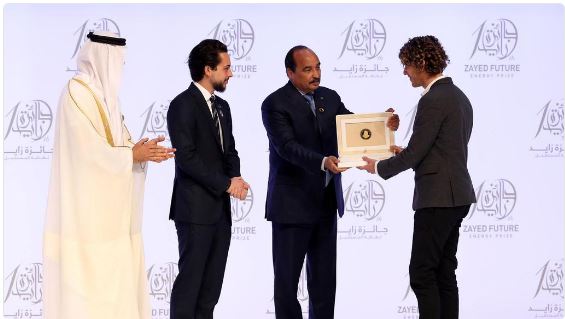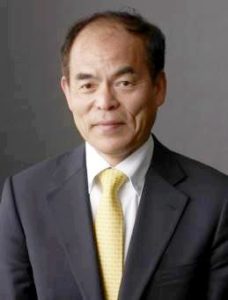Zayed Future Energy Prize Rewards Pioneers

Abu Dhabi Crown Prince Sheikh Mohamed Bin Zayed, Jordan’s Crown Prince Hussein Bin Abdullah II and the President of Mauritania Mohamed Ould Abdel Aziz present the Small and Medium Enterprise award to Thomas Samuel, CEO of Sunna Design, Jan. 23, 2018, Abu Dhabi, UAE (Photo courtesy Sunna Design via Twitter) Posted for media use
By Sunny Lewis
ABU DHABI, United Arab Emirates, February 8, 2018 (Maximpact.com News) – “Driving the Global Energy Transformation” was the theme of the largest sustainability gathering in the Middle East, Abu Dhabi Sustainability Week held in January, and highlighted by the presentation of the Zayed Future Energy Prize awards, worth US$4 million.
Now in its 10th year, the Zayed Future Energy Prize jury chooses its winners through a rigorous evaluation process. The jury includes former heads of state, energy experts and well-known personalities committed to accelerating the adoption of renewable energy and advocating sustainable development.
“The Zayed Future Energy Prize has helped to transform lives in some of our poorest communities through its winners, while promoting innovation, education, new policies and other best practices in sustainability and renewable energy elsewhere on the global stage,” said Chair of the Zayed Future Energy Prize Jury and Former President of Iceland Ólafur Ragnar Grímsson.
“The positive international dialogue encouraged through the prize is essential if we are to maintain the global consensus on the need for proactive action to mitigate climate change and to adopt more sustainable forms of energy,” said Grímsson.
He added, “I would like to thank the leadership of the UAE for their support and the role they played in the success of the Prize that was inspired by the late Sheikh Zayed Bin Sultan al Nahyan.”
The Prize fund comes from the Abu Dhabi Government as a way to honor and continue the legacy of the late founding father of the United Arab Emirates, Sheikh Zayed bin Sultan Al Nahyan.
Masdar, Abu Dhabi’s renewable energy company, manages the Zayed Future Energy Prize.
The awards were presented by Abu Dhabi Crown Prince Sheikh Mohamed Bin Zayed, assisted by Jordan’s Crown Prince Hussein Bin Abdullah II and the President of Mauritania Mohamed Ould Abdel Aziz.

The Lifetime Achievement Award winner Shuji Nakamura, professor of materials and electrical and computer engineering at the University of California, Santa Barbara, a pioneer in the development of white LED lights. (Photo courtesy University of California, Santa Barbara) Posted for media use
Lifetime Achievement Award Winner: Shuji Nakamura
This year, the Lifetime Achievement Award, a prize of $500,000, went to Shuji Nakamura, professor of materials and electrical and computer engineering at the University of California, Santa Barbara, for pioneering the development of white LED lights.
A winner of the 2014 Nobel Prize in Physics, Nakamura is one of three individuals credited for creating the highly valued bright-blue LED. His research on blue lasers and LEDs has been integral to the creation of Blu-ray discs, and to enhancements now commonplace in TVs, mobile phones, and movie projectors.
That advance paved the way for the white LED technology that now enables energy-efficient interior and exterior lighting, displays and automotive headlamps. The use of LED lights has revolutionized energy savings, making it possible to reduce fossil fuel use and carbon footprints.
LED lights have avoided the emission of some 880,000 tonnes of the greenhouse gas carbon dioxide in Africa alone while extending energy access to millions of people.
“The 2018 Zayed Future Energy Award recognizes the global impact of solid-state lighting technology on both the climate and the citizens of our planet, and I am honored that my work in this field is again being highlighted,” Nakamura said.
Small and Medium Enterprise Award Winner: Sunna Design
The 2018 winner in the Small and Medium Enterprise category, Sunna Design, received the US$1.5 million prize for its work in solar-powered street lighting, which has improved security, quality of life and socio-economic opportunities in isolated villages and refugee camps in developing countries.
Based in Bordeaux, France, Sunna designs and manufactures innovative solar street lighting suited for extreme climate conditions; they can sustain harsh desert conditions for up to 15 years. Just eight years old, the company has installed over 8,000 projects in more than 20 countries.
A battery is required to store solar energy during the day for use at night; energy storage is critical. Most systems use heat-sensitive lead-acid batteries with a short lifespan of two to four years. Sunna has chosen to use an innovative technology – reliable nickel metal-hydride (NiMH) batteries.
These small batteries are integrated into the streetlight at the top of the mast, which simplifies installation. No battery has to be buried in the ground, there’s no electrical connection to make through the mast. The also limits vandalism.
On receiving the US$1.5 million award, Sunna tweeted a statement saying, “This award provides, once again, a proof of the reliability of our technology. We now take this award as a sincere encouragement in our future projects. Thus, we fully realize the scope of our responsibilities as a winner and seek to positively impact the global economy.”
Non-profit Award Winner: The SELCO Foundation
The SELCO Foundation, winner in this year’s Non-profit category, also was presented with a US$ 1.5 million prize. The foundation offers micro-loans to extend energy access in impoverished communities, and education programs aimed at raising awareness of the benefits of sustainability and renewable energy.
Started in 2010 as an open source, not-for-profit, public charitable trust, the SELCO Foundation is based in Bangalore, Karnataka, India.
It recognizes India as a microcosm of world’s disparities, with nearly 25 percent of its population, 300 million without electricity and more than 70 percent, 700 million who rely on polluting wood and charcoal cook-stoves.
SELCO Foundation seeks to become a library of field tested solutions that can formulate decentralized low carbon pathways for the poor across geographies and contexts.
Large Corporation winner: Google
Google was named Large Corporation winner for 2018 for its leadership in implementing renewable energy and reducing carbon emissions. There is no monetary prize that goes with this prestigious award.
Based in California, in 2016, Google marked 10 years of operating as a carbon neutral company and announced that it will reach 100 percent renewable energy for its global operations in 2017.
Google’s expertise in data analysis and digital innovation has led to the development of the smart thermostat and the utilization of machine learning to optimize the integration of renewables into electricity grids.
Five Global High School Winners: One for Each Region
The Global High Schools category of the Zayed Future Energy Prize was established in 2012 to help cultivate tomorrow’s energy leaders and sustainability advocates.
Each of this year’s school winners, representing a total of five world regions, received a US$500,000 prize. Each demonstrated exceptional initiative in promoting sustainability and renewable energy in the local community.
The 2018 recipients are Aouda Saadia High School representing Africa; Centro Educativo Mbaracayu for the Americas; Bahrain Bayan School for Asia; Vladimir Nazor School for Europe; and Motufoua Secondary School representing Oceania.
Youth-supported sustainability projects have flourished due to the Global High Schools winners, generating an estimated three million kilowatt hours of renewable energy and displacing 2,372 tonnes of carbon dioxide in total, according to Zayed Future Energy Prize officials.
Held from January 12-21, Abu Dhabi Sustainability Week welcomed tens of thousands of attendees, including: heads of state, government ministers and international trade delegations, local communities, and young people passionately engaged in energy and sustainability issues.
The week’s anchor event, the World Future Energy Summit hosted more than 600 companies from 40 countries.
The Climate Innovation Exchange (CLIX)
The Climate Innovation Exchange (CLIX), held under the patronage of the UAE Ministry of Climate Change and Environment for the United Arab Emirates, provides emerging entrepreneurs and innovators with the chance to forge partnerships with leading global investors.
CLIX enabled US$17.5 million in investment intent for 16 start-ups at World Future Energy Summit 2018 during Abu Dhabi Sustainability Week.
Dr. Thani Ahmed Al Zeyoudi, Minister of Climate Change and the Environment, said that the CLIX forum was one of the key platforms at Abu Dhabi Sustainability Week.
CLIX provides a competitive environment that brings together investors and innovative entrepreneurs in an effort to boost partnerships and innovation, as well as transform creative ideas into reality.
“Abu Dhabi Sustainability Week reinforces the country’s strong position in the clean energy, climate and environment sectors,” the minister said, “and highlights its efforts to develop local talent and attract global expertise to find effective solutions to the most important challenges facing the international community.”
